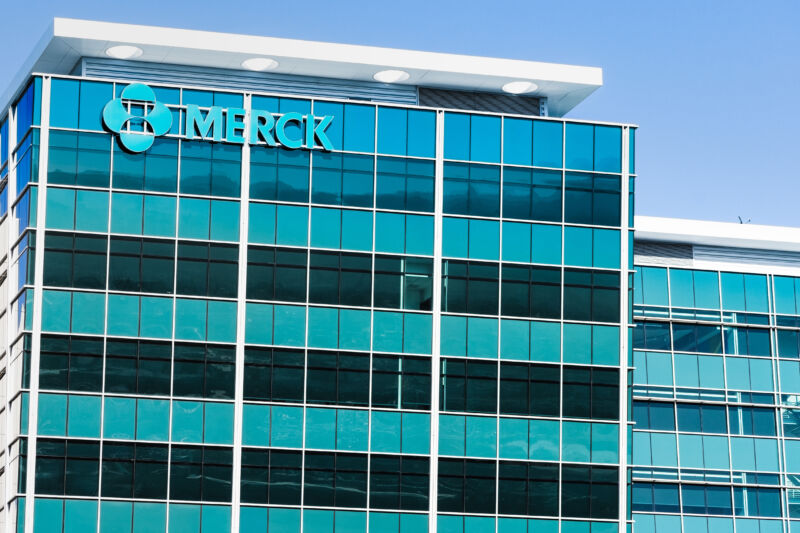
A storm is brewing over the pricing and licensing of Merck’s antiviral pill molnupiravir, which the pharmaceutical giant says can halve the risk of hospitalization and death in high-risk COVID-19 patients.
Merck’s advance purchase agreement with the US government pegs the price of a five-day treatment at about $700. But an independent analysis by public health researchers at Harvard estimated that a sustainable generic price—with a 10 percent profit margin built in—would be just $20 per treatment. Further, rival generic manufacturers in India are already expected to offer the drug at $15 or less for a treatment once it’s authorized for use.
Given that, the $700 price tag in the US represents a 46-fold markup of the drug, which is named after Thor’s hammer, Mjölnir.
In a statement earlier this week, Doctors Without Borders/Médecins Sans Frontières (MSF) struck hard at the pricing as well as at Merck’s licensing agreements. “Instead of offering broad open licenses widely to all able manufacturers in different countries, a narrow voluntary license approved by Merck in April 2021 only includes Indian generic companies,” Leena Menghaney, South Asia head of MSF’s Access Campaign, said in a statement. “This hinders countries like Brazil from being able to produce and import generic versions and raw materials. Middle-income countries excluded from the license had 30 million COVID-19 infections in the first half of 2021—50 percent of all infections in low- and middle-income countries.”
Another strike against Merck’s plans so far is that, while the pharmaceutical giant is expected to reap billions in profits, it was not responsible for the drug’s development; Merck is not recouping research and development costs here. Molnupiravir was developed by researchers at Emory University with an estimated $35 million in federal funds, including grants from the National Institutes of Health and the Defense Department. The drug was in the works for years before the pandemic. Pharmaceutical company Ridgeback Biotherapeutics bought the rights to the drug in early 2020 and partnered with Merck a few months later.
Merck is not only selling molnupiravir to the US government at a 46-fold markup; it’s selling a drug the US government has already spent millions to develop. Industry analysts have projected that Merck will make $5.3 billion in sales in 2022 alone and $22 billion through 2030, according to Business Insider.
Needs and costs
MSF warns that if Merck does not lower its pricing and/or allow for more generic manufacturing, “it will significantly limit global access to the world’s first oral antiviral treatment for COVID-19.”
“If approved for use, the first oral antiviral treatment molnupiravir could be a major step forward in the provision of potentially lifesaving care for COVID-19 patients in resource-constrained settings, where billions of people remain unvaccinated and vulnerable to the disease,” MSF’s Menghaney said. “The drug will need to be made available and affordable as quickly as possible for people who need it everywhere. Oral drugs will be easier to use than the treatments that exist for COVID-19 so far and allow for much broader administration—as long as they are affordable.”
In an emailed statement to Ars, Merck noted that the price that the US government is paying with its advance purchase agreement does not set the official price for the drug moving forward.
“If authorized or approved by local regulatory agencies, we plan to implement a tiered pricing approach based on World Bank data that recognizes countries’ relative ability to finance their health response to the pandemic,” a Merck spokesperson told Ars. Merck is also “in discussions with various governments and other organizations regarding access approaches,” the spokesperson added.
On Monday of this week, Merck and Ridgeback applied for Emergency Use Authorization for molnupiravir from the Food and Drug Administration. Aside from the controversial pricing so far, if the drug is authorized in the US, it is likely to be a cheaper and simpler treatment option than what’s already available. As Business Insider notes, the US government pays $2,100 for an infusion of Regeneron’s COVID-19 antibody cocktail and $3,200 for a five-day intravenous course of Gilead Sciences’ antiviral remdesivir.
The highly effective and safe COVID-19 vaccines—which can prevent hospitalizations, deaths, disease spread, and the need for all of these pricy drugs—range in price from $10 to $40 per shot in the US.
https://arstechnica.com/?p=1804162

